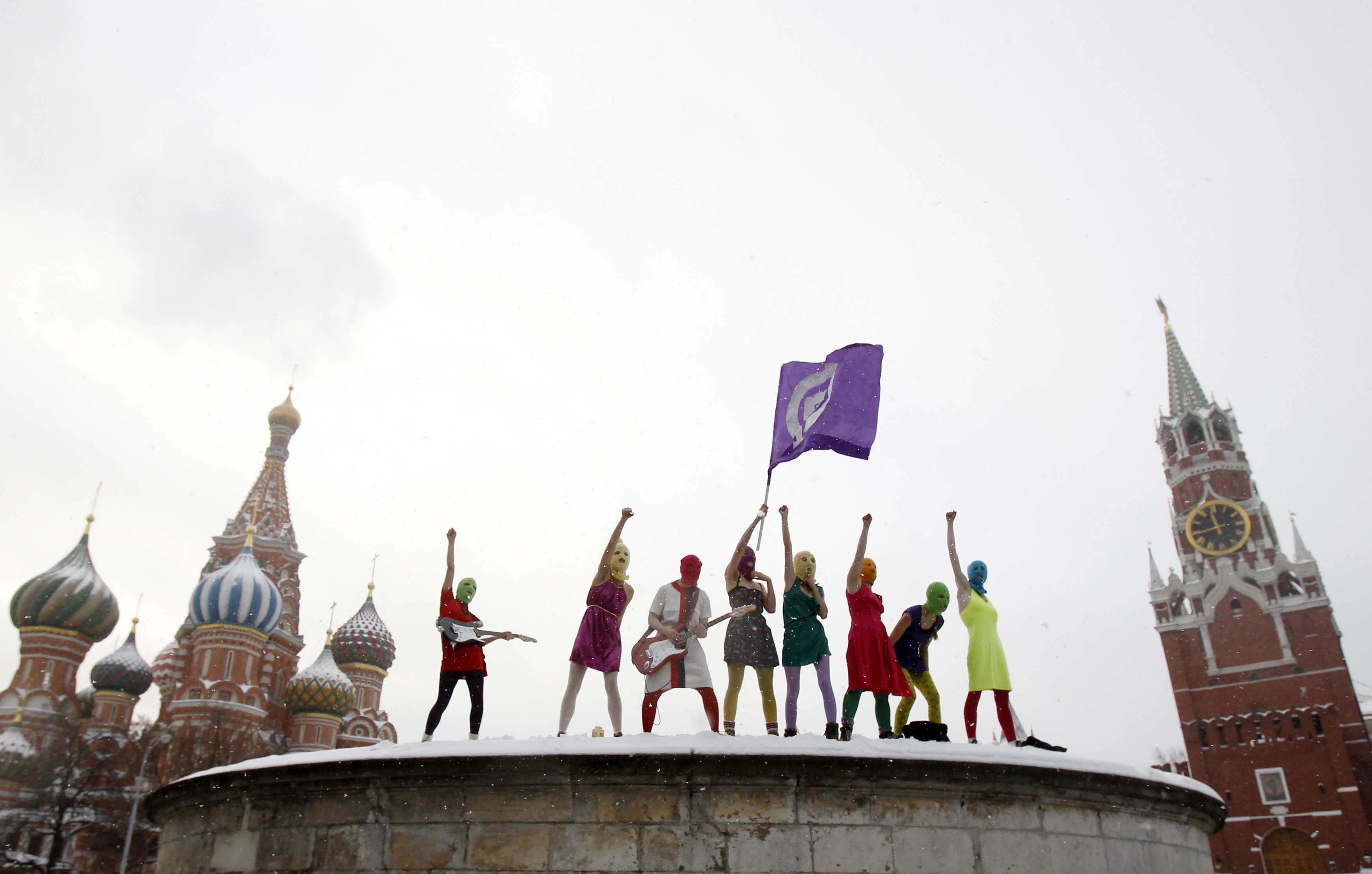Russian Pussy Riot punk rock collective members Natalia Tolokonnikova, Maria Alyokhina, and Yekaterina Samutsevich have been convicted of hooliganism and sentenced to 2 years in prison.
On February 21, 2012 five girls wearing brightly colored masks stormed the altar of downtown Moscow’s Christ the Savior Cathedral to perform a protest song entitled, “Holy Sh*t.” Shortly thereafter, an edited video of the performance that was uploaded to the Internet incited a major public outcry.
Who is Pussy Riot?
According to advocacy website freepussyriot.org, Pussy Riot is a punk rock collective that formed in October 2011 with the aim of protesting policies unfavorable to such human rights principles as gender equality, democracy, and freedom of expression. These protests take the form of performance art and are staged in highly visible settings; Red Square and the roof of a Moscow prison both served as stages for the group prior to the incident in Christ the Savior Cathedral.
The advocacy group alleges that through their performances, the group seeks to protect values and principles enshrined in the Russian Constitution, as well as in such international legal instruments as the Universal Declaration of Human Rights and the Convention on the Elimination of All Forms of Discrimination against Women.
What is the crux of the controversy?
The controversy surrounding the Pussy Riot trial centers on the competing interests of free speech and religious sanctity.
On the one hand, Tolokonnikova, Alyokhina, and Samutsevich have consistently maintained that the Christ the Savior Cathedral performance was politically and artistically - rather than religiously - motivated. Their defense team has maintained that the incident was a legitimate, albeit shocking and controversial, exercise of free speech and free expression.
Supporters around the world have viewed the detained Pussy Riot members as prisoners of conscience and have demanded their release.International celebrities such as Jonny Rotten of the Sex Pistols, Bjork, Madonna, Elijah Wood, Danny Devito, Sting, the Red Hot Chili Peppers, Franz Ferdinand, and Faith No More have voiced their support for the group. In a highly publicized move, more than 100 Russian celebrities filed an appeal on behalf of the band in June 2012. With the help of such high-profile advocacy groups as Amnesty International, the Pussy Riot detention has spiraled into an international cause célèbre.
On the other hand, critics have vehemently criticized the group for what has been viewed as an obscene performance in a space that is seen as sacred to the Russian Orthodox Church. Toward this end, on April 22, 2012 the church held a nationwide prayer in “defense of the faith” in order to protect the church from attacks by “anti-Russian forces.”
Prosecutors have maintained that the Pussy Riot members "inflicted substantial damage to the sacred values of the Christian ministry…infringed upon the sacramental mystery of the Church… [and] humiliated in a blasphemous way the age-old foundations of the Russian Orthodox Church."
What is hooliganism?
Hooliganism is defined in Article 213 of the Russian Criminal Code as "a gross violation of public order, clearly expressing contempt for society." It is categorized as a crime against public security and public order.
Tolokonnikova, Alyokhina, and Samutsevich each faced up to seven years imprisonment.
The criminal case
The trial has been heavily scrutinized by domestic and international media outlets since its start in Moscow's Khamovnichesky District Court on July 30, 2012.
The first week of trial was replete with 12-hour hearings featuring a patchwork of witness testimony ranging in subject matter from demon possession to “the gold of Judas.” The time not spent on witness testimony was generally devoted to a long-lasting verbal sparring match between defense attorney Violetta Volkova and Judge Marina Syrova.
Lawyers for the aggrieved parties and - on numerous occasions - those for the defense moved for presiding Judge Marina Syrova to recuse herself from the case. Syrova rejected each such motion as baseless.
On the final day of proceedings, prosecutors requested three-year sentences for each of the defendants. Viewing the punk prayer as both premeditated and deeply offensive to Orthodoxy, the prosecutor argued that it was necessary for the girls to spend “real time” behind bars.
Attorneys for the aggrieved parties agreed with the sentence as requested by the prosecution, but noted that one of the aggrieved parties believed that the girls should only face two years of probation, in order to allow the mothers among them to reunite with their young children as quickly as possible.
Both attorneys for the aggrieved parties focused acutely on the damage done to religious sanctity by virtue of the punk prayer. Attorney Larisa Pavlova viewed the girls’ fist-pumping during the performance as blatantly insulting to believers. After criticizing Tolokonnikova’s life choices and Alyokhina’s university curriculum, she appealed to the judge to issue a mandate requiring universities to take preventative measures in order to ensure against the future commission of acts of hooliganism at the hands of their pupils. Her co-counsel, Lev Lyalin, lamented the act as one of nihilism, and recommended Nietzsche as a means of better understanding the Cathedral incident.
Defense attorneys Violetta Volkova and Mark Feigin did little to hide their disgust, both with the prosecution’s request and with the trial as a whole. Volkova proclaimed her intention to appeal the conviction to the European Court of Human Rights, and lambasted the prosecution for failing to uphold its duty to promote justice above all else. Feigin criticized the political nature of the proceedings and the blurring line between church and state.
For a more detailed account of what has transpired throughout the course of the trial, please see our live broadcasts and summaries:



